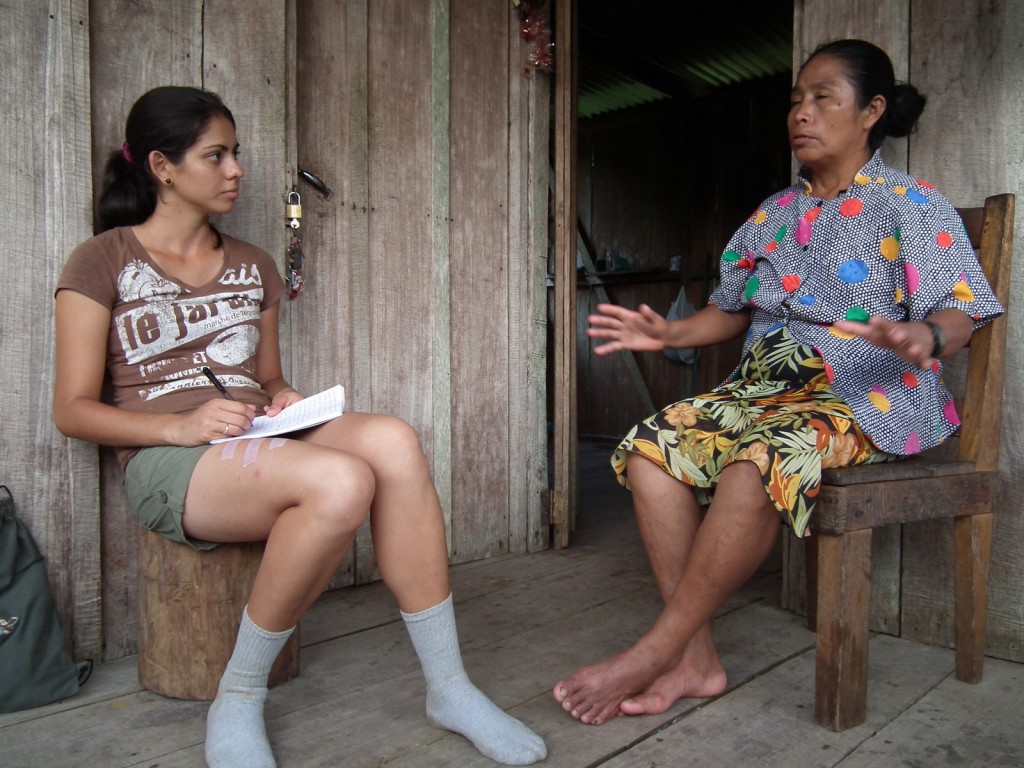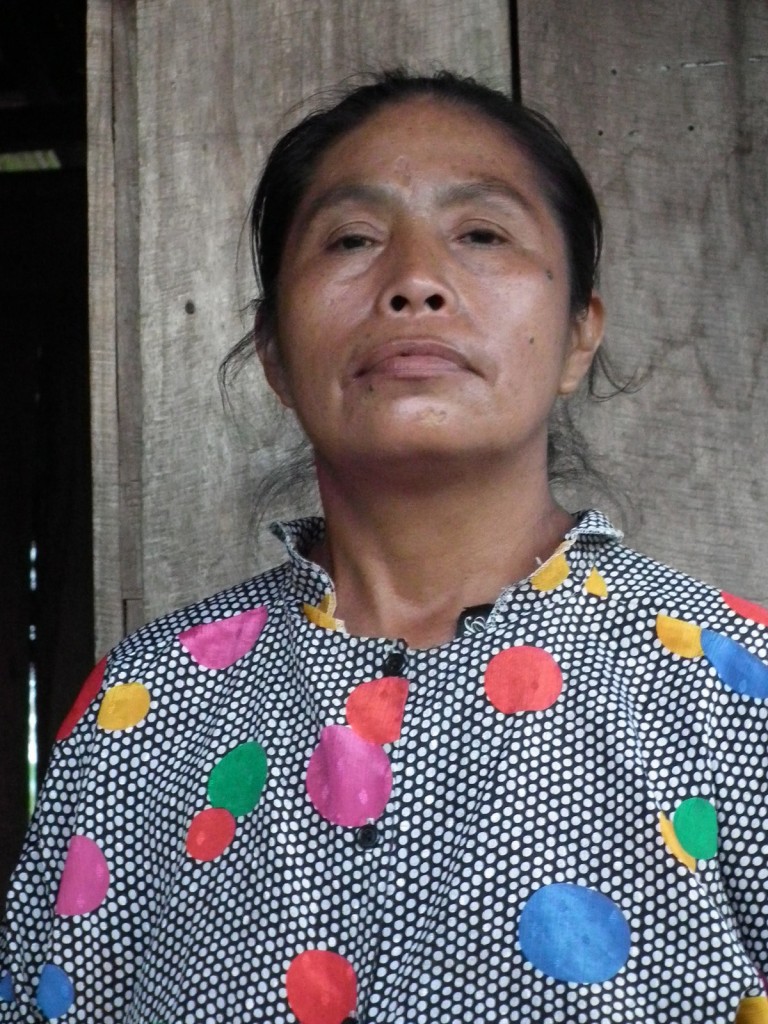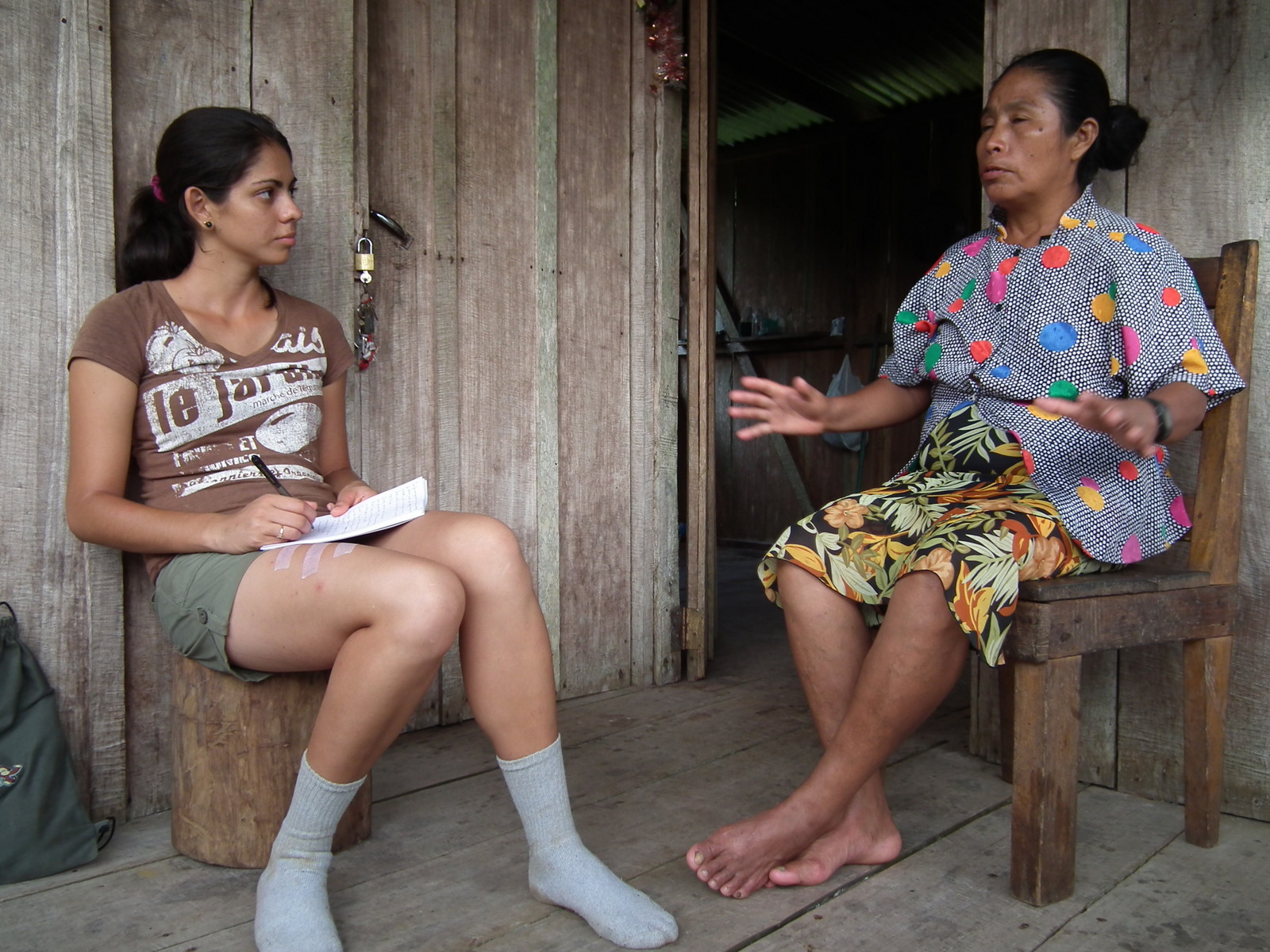 Sinforiana is 55 year’s old and one of the village elders of Pozo Azul in Bajo Chirripo, Costa Rica. She is the mother of Arnaldo, Yoleny, Nemesio and Adrian – who hosted the Raleigh project team, housed and fed us.
Sinforiana is 55 year’s old and one of the village elders of Pozo Azul in Bajo Chirripo, Costa Rica. She is the mother of Arnaldo, Yoleny, Nemesio and Adrian – who hosted the Raleigh project team, housed and fed us.
This post is the result of an interview with Sinforiana by Fer Zuniga and myself, translated from Spanish to English by Tutti and rewritten in the first person by myself – some interpretation was required as Sinforiana’s mother tongue is Cabecar and her Spanish limited. We asked her about her life growing up in Pozo Azul, her earliest memories, how things had changed and what she thought about the Raleigh project team.
Sinforiana and life in Pozo Azul: “Many people are scared to talk to people like you, but I am not. I talk to everyone and I am very happy you are here. People from the community are embarrassed because they have brown skin and are afraid to talk with white people [Costa Ricans]. The community were very afraid when the school was built 10 years ago about what the white people might do to our community, but life has got much better, we now have a road in and everyone has wooden houses. I feel the culture is improving and I feel happy because each day there is more facilities than ever before. I am also happy because I live near my family and every member is close to each other.
When I was growing up only our family lived in the Pozo Azul. We were 9 children. There was no road in, no wooden houses; we lived in a traditional circular banana thatched ‘hu’ [house]. There were no other houses nearby, no school and no clinic. In those days lots of wild animals roamed across the valley – but now the number of animals have dropped a lot. In the past the people had different places to keep animals and different places for the crops, to stop the animals eating the crops. Now my sons are trying to do the same by the building of the pigsties, so that we may start to grow our own crops again.
When I was young, people in the community didn’t have so many clothes as now. Normally they only had three sets of clothes, one set to go outside of the community, one set for work and another for being in the house.”
Her earliest memories: “One of my first memories was my father harvesting cocoa. To sell it he had to walk across the mountain with two sacks on his shoulders. Once I went with him. I cried so much because I was very tired; in Zent he bought me candy and biscuits which made me very happy, but we still had walk back again. When the rain was heavy, the river would be high for days cutting us off from the outside world. We ate what we grew because we needed four hours to go out crossing the mountain to buy food. Sometimes, when the food got too low, my brother was forced to swim cross the river which was dangerous.”
 On bringing up her family: “In the past births were at home. My mother had all her 9 children in the house, but people were afraid because many babies and mothers died of the complication of the births. My first two children (Arnaldo and Yoleny) were born in the house, and the last two (Nemesio and Adrian) at the hospital in Limon. From that time each baby was born at the hospital. My husband, Geraldo abandoned me, and I raised my children on my own, with help from my father. These were very hard years. None of the children went to school, however one of my brother’s knew how to read and write and the children were taught by him. Adrian went to work in the banana factories age 12, where only Spanish was spoken – so he had no choice but to learn to read and write Spanish. Even though he is my son and I will always say good things about him, he is much cleverer than me and it is lucky because he has been able to do much for the community. [Adrian, was the President of the Development Association at the time of the Delta3, Raleigh project. It was through his efforts Raleigh came to build the community centre. Apart from Pozo Azul, his responsibilities spread across 8 other communities]. Arnaldo, my oldest son is the builder in the community. It is Arnaldo who built all our wooden houses. I feel very fortunate that my sons have built me a new house. I am very happy for you to use my house while you are here. I have not moved in yet, I am waiting for Nemesio or Adrian to build the waterpipe for my house.”
On bringing up her family: “In the past births were at home. My mother had all her 9 children in the house, but people were afraid because many babies and mothers died of the complication of the births. My first two children (Arnaldo and Yoleny) were born in the house, and the last two (Nemesio and Adrian) at the hospital in Limon. From that time each baby was born at the hospital. My husband, Geraldo abandoned me, and I raised my children on my own, with help from my father. These were very hard years. None of the children went to school, however one of my brother’s knew how to read and write and the children were taught by him. Adrian went to work in the banana factories age 12, where only Spanish was spoken – so he had no choice but to learn to read and write Spanish. Even though he is my son and I will always say good things about him, he is much cleverer than me and it is lucky because he has been able to do much for the community. [Adrian, was the President of the Development Association at the time of the Delta3, Raleigh project. It was through his efforts Raleigh came to build the community centre. Apart from Pozo Azul, his responsibilities spread across 8 other communities]. Arnaldo, my oldest son is the builder in the community. It is Arnaldo who built all our wooden houses. I feel very fortunate that my sons have built me a new house. I am very happy for you to use my house while you are here. I have not moved in yet, I am waiting for Nemesio or Adrian to build the waterpipe for my house.”
On marriage: “When the children grew up they all went outside of Pozo Azul to find husbands and wives – [Cabecar tradition does not allow marriage within a community which is already tightknit and closely related]. All my children have since returned and brought back spouses to the community – [it is this group, from which she now has 21 grandchildren that makes the core of Pozo Azul]. Regarding marriages , most of couples simply decide to life together, but there are some couples who go to Limon to get married there, by the legal way, and then in the community church.”
On earning living: “I cook for the school, but I do not receive a good pay from the government, because there are less than 30 children at the school [just 19 when Raleigh were there], so mainly I live on food rations from the school.”
On the Raleigh project team: “I am very happy that you have come to stay and to help us build the community centre. I thank everyone for coming such a long way, for being away from your own families for so long. I also thank your families for letting you be away from them for so long to come to help the people of Pozo Azul. Raleigh are people of good heart and I would like to do something to help you someday, but I do not have the chance to go to where the people of Raleigh are, because it is very, very far. I am surprised that you came so far and left your families, because when I go to San Jose for 3 or 4 days, I feel pain in my heart leaving my family, so I do not understand how you are here.
I pray to God to look after you and that you all go home safe and well”.
